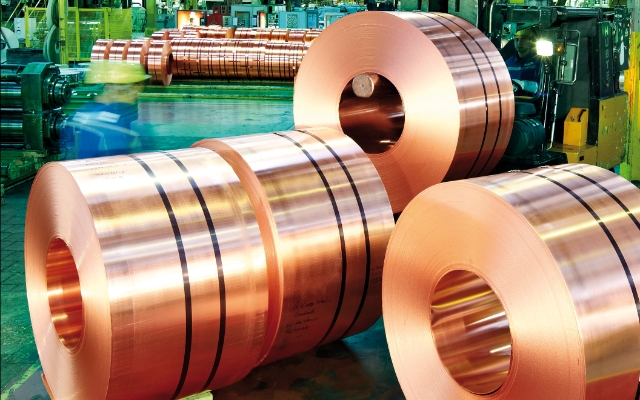Discovering the Diverse Applications of Copper Products in Modern Industries
From improving the efficiency of electric systems to playing an essential duty in renewable power modern technologies, the convenience of copper is apparent. As sectors increasingly focus on technology and sustainability, the diverse applications of copper require a closer exam, particularly regarding their potential impact on future environmental practices and technological innovations.
Electric Applications of Copper
Copper is an essential product in the electric sector, accounting for roughly 60% of the complete demand for non-ferrous metals internationally - Copper Products. Its premium electric conductivity, which is virtually twice that of aluminum, makes it the preferred selection for a wide variety of electrical applications. From electrical wiring systems in residential and industrial structures to high-voltage power transmission lines, copper guarantees performance and integrity in electricity delivery
Along with wiring, copper is essential to the production of electric elements such as generators, transformers, and motors. These parts leverage copper's thermal conductivity and malleability, crucial for warm dissipation and efficient efficiency. Additionally, copper's resistance to deterioration improves the life expectancy and toughness of electrical systems, making it a cost-efficient service in the long term.
The development of renewable resource resources, such as solar and wind power, has further enhanced the demand for copper in electrical applications. As sectors transition towards sustainable power solutions, copper's function becomes even much more critical. Overall, the convenience and performance features of copper strengthen its condition as a cornerstone material within the electric sector, driving advancement and efficiency throughout various applications.
Pipes and Piping Solutions
In modern plumbing systems, the choice of products significantly affects both performance and longevity. Copper has actually arised as a preferred alternative due to its special properties, consisting of corrosion resistance and antimicrobial qualities. These features ensure that copper piping remains safe and sturdy for carrying safe and clean water, a crucial factor to consider in domestic and industrial applications.
Among the vital benefits of copper in pipes is its capacity to endure heats and pressures, making it suitable for a variety of applications, from warm water systems to home heating and cooling down networks. Additionally, copper's flexibility permits simpler installment in complex piping formats, reducing the risk of leakages and failures.
Another noteworthy benefit is copper's long lifespan, commonly exceeding half a century with proper maintenance. This durability not just decreases replacement expenses however additionally adds to lasting techniques by lowering waste. Copper's recyclability straightens with contemporary environmental requirements, advertising a circular economy within the pipes market.
Copper in Renewable Energy
The flexibility of copper expands beyond pipes applications, playing a vital function in the eco-friendly power industry. his explanation In solar panels, copper is utilized in solar cells and circuitry, helping with efficient power conversion and transmission.

In addition, as the worldwide demand for electric vehicles (EVs) increases, copper's role in battery systems and billing facilities ends up being much more significant. The material's capacity to conduct electrical power effectively is essential to the performance of EV batteries, improving array and billing rate.
Copper's Function in Electronics
Electronics making counts heavily on copper's extraordinary buildings, specifically its high electric conductivity and thermal efficiency. These characteristics make copper an optimal selection for a large range of digital elements, including adapters, circuit boards, and electrical wiring. The metal's capacity to effectively check these guys out transfer electric signals makes sure minimal power loss, which is important in high-performance electronic tools.
In addition, copper's thermal conductivity plays a substantial function in warm dissipation, protecting delicate components from overheating. This is specifically vital in modern-day electronics, where portable styles bring about enhanced warm generation. Copper is likewise favored for its malleability and ductility, allowing it to be quickly formed right into complex layouts that satisfy the needs of advanced digital applications.
With the surge of customer electronics, telecommunications, and electric automobiles, the need for copper in the electronic devices industry proceeds to expand. Thus, copper continues to be a cornerstone product in the ever-expanding area of electronic devices.
Innovative Makes Use Of in Manufacturing

One notable application remains in additive manufacturing, where copper-based products are utilized in 3D printing procedures. check this This permits for the creation of light-weight components and complicated geometries, especially in the aerospace and automobile industries. Additionally, copper's thermal conductivity makes it an excellent option for warmth exchangers, enhancing performance in commercial cooling systems.
Additionally, the rise of wise production has seen the unification of copper in IoT gadgets, where its conductive capabilities sustain sophisticated noticing modern technologies. In the world of sustainable power, copper is pivotal in the manufacturing of photovoltaic panels and wind turbines, assisting in more reliable energy conversion and circulation.
As markets make every effort for sustainability and innovation, copper's adaptability and efficiency remain to place it as a vital product, driving advancements in manufacturing and adding to the growth of smarter, more reliable items.
Conclusion
The important role of copper in renewable power and its crucial feature in electronic devices underscore its value in progressing sustainable practices. Jointly, these applications highlight copper's important contribution to technological progress and industrial efficiency in modern society.
From boosting the effectiveness of electric systems to playing an important duty in renewable energy modern technologies, the adaptability of copper is evident. As industries significantly prioritize technology and sustainability, the varied applications of copper call for a closer evaluation, particularly regarding their prospective impact on future technical innovations and ecological practices.
The development of renewable power sources, such as solar and wind power, has even more boosted the need for copper in electrical applications. In general, the adaptability and performance attributes of copper solidify its condition as a cornerstone material within the electrical sector, driving advancement and performance across numerous applications.
The flexibility of copper expands beyond pipes applications, playing a crucial duty in the renewable power sector.